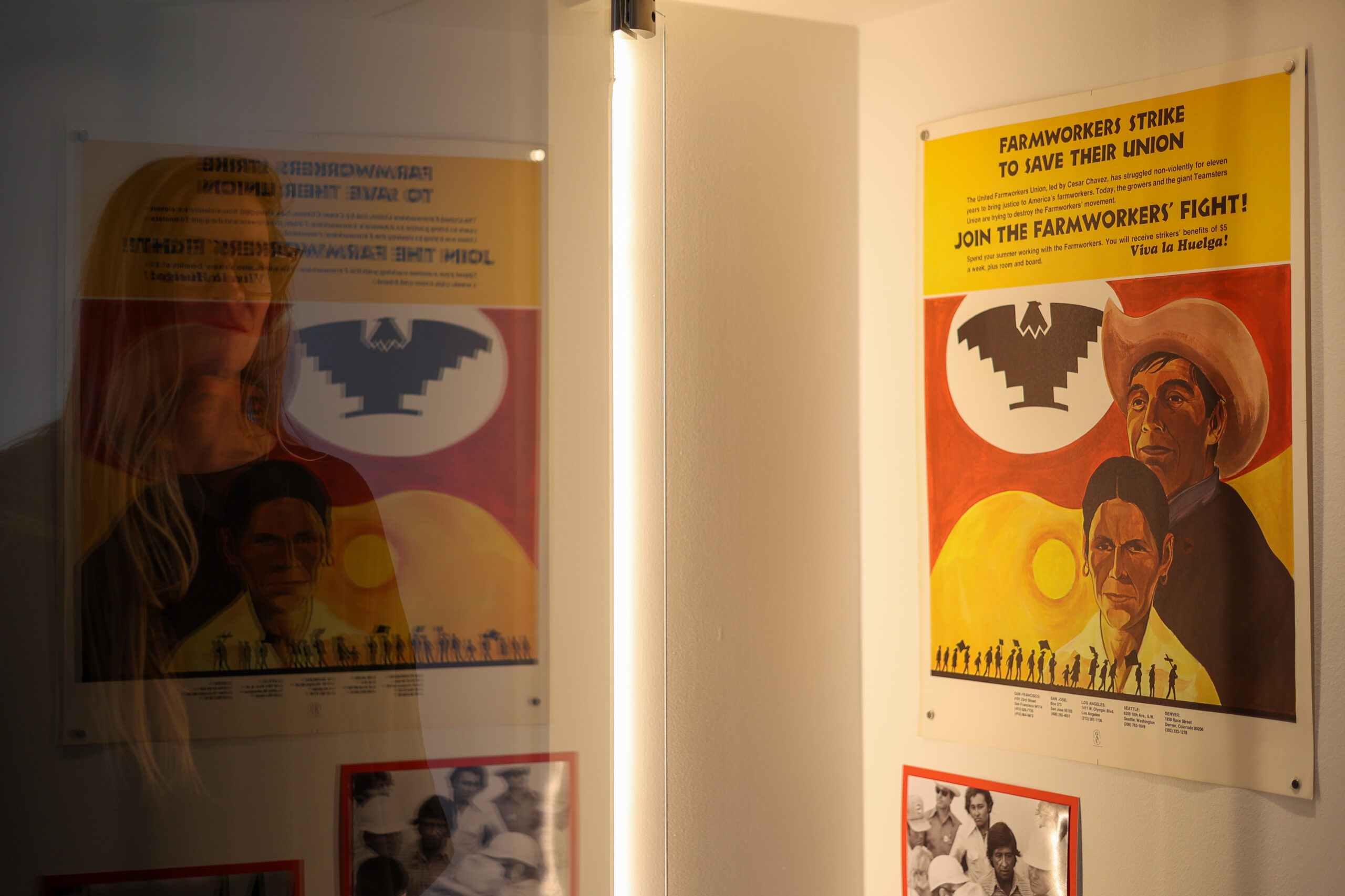You could say that Wes Wilson lit the world of poster art on fire when the late San Francisco-based artist unveiled his bold new typographic design.
Widely considered to be the “original” psychedelic rock poster, the 1966 “Flames” flier as it’s sometimes called, was created to promote a concert headlined by Los Angeles sunshine pop band The Association at the Fillmore. Barely legible but certainly eye-catching, the wavy red lettering against a Christmas-tree green backdrop became an iconic symbol for the “turn on, tune in, and drop out” era.
A print of that poster, along with dozens of others from the period, is currently on display at the Haight Street Art Center as part of the new exhibit, Psychedelic Renaissance: Posters from the Family Dog & Bill Graham Presents, 1965-1967 now on view through May 15.
Preserving the legacy of such era-defining posters has been a part of the Haight Street Art Center’s mission since it was founded by a collective of rock poster enthusiasts and collectors in 2017. Now, as the center moves into a post-Covid world, it’s starting to reimagine and expand the role of poster art in its mission, says Executive Director Kelly Harris.
Harris, an alum of the all-girl electro soul-punk San Francisco-based group Von Iva and one-time owner of Lucky Alley Gallery, took the helm of the center in October 2020 and sees psychedelic rock posters like Wilson’s as an entry point to further community engagement and “activism.”
Case in point: the Haight Street Art Center’s concurrent exhibition, Turning the Table: Awareness for Farmworker Equity, features historic protest posters produced to support the collective organizing efforts of California farmworkers during the five-year Delano table grape strike.
“A couple of the posters were really kind of instrumental in spreading the word around the grape boycott,” Harris said, pointing out posters encouraging farmworkers to join the strike and urging consumers to not buy grapes, wine and other agricultural goods. One poster even urges shoppers to “boycott Safeway” altogether. Another implores voters to vote no on Prop 22, a ballot measure that would have outlawed strikes and boycotts by farmworkers. The United Farm Workers (UFW) led by activists such as Cesar Chavez and Dolores Huerta successfully organized to defeat the proposition in California’s 1972 elections.
“We know that these posters really helped to raise awareness in places like middle America and [to] educate buyers,” said Harris, also noting that the exhibit showcases contemporary posters honoring the farmworkers of today. “So we kind of work to celebrate the importance of the poster to carry important messages.”
Another way that Harris hopes to communicate the power of poster art is by opening up the Haight Street Art Center to more community members, in addition to the local schools and youth it’s already working with, so that more San Franciscans can experience the power of screen printing firsthand. In the center’s large state-of-the-art screen printing studio, Harris imagines workshops led by local artists, intergenerational exchanges of stories and skills between San Francisco youth and elders, panel discussions, screenings and other artistic activities happening in the space throughout the day. The space has been mainly used to reproduce rock posters for retail purposes, explains Harris, but she wants to expand the role of the studio going forward.
“I’m upset that these places aren’t packed with people pulling screens,” said Harris. “Our goal is to really partner with other organizations and artists and allow for lots of different voices to come into the space and help us define what we’re doing.”
Since Harris has taken over, the center has started showcasing posters in glass cases outside (a pandemic initiative to keep exhibiting the center’s artwork safely) and transformed its retail poster space into a pop-up for showcasing local artists’ work. Harris also hopes to be able to host book signings as well as DJs and bring a portable print unit from upstairs down to the ground floor to have “pop-up print moments” at street level.
Another vehicle to share the power of screen printing? A bright orange bike with a mobile screen printer on the back that the center takes out to support its community programming.
“I think there is something to pulling ink through a screen that makes you feel closer to your art, closer to the messaging,” says Harris of the relatively low cost and low tech way of producing art. “It’s a tactical experience. It’s something you remember. You take that poster with you, and it’s like suddenly you’re part of the activism, right?”
Ultimately, Harris feels a “responsibility” to open up the center as much as possible going forward to respond to the “transient nature” of San Francisco.
“I’ve been in the city for maybe 30 years, and I’ve gone through the roller coaster of spaces being available to artists and then closing down and folks leaving, going to the East Bay,” said Harris, noting how no matter how much SF changes there’s “always the need for space.”
But don’t expect the Haight Street Art Center’s countercultural roots to go away completely. Some 4/20 programming is in the works.
“We can hold our history here, but then we have space to explore other pieces of the importance of activism through poster art,” said Harris.
One imagines the hippies would be proud.
The Haight Street Art Center is located at 215 Haight St.
